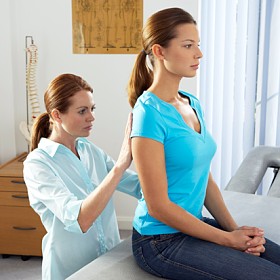Introduction To Lower Back Pain (LBP)
Lower Back Pain is one of the most common musculoskeletal problems that will affect almost all of us at some point in our lives. Recent statistics indicate that up to 8 in 10 of us will have one or more cases of lower back pain during our lifetime. The lower back is an array of muscles, tendons, ligaments, nerve and bones that all come together that allow us to move and help in the transfer of forces and loads from the upper body down into the lower body. By understanding a little about how the spine works, this can inform how you can aid the recovery of LBP, particularly with regards to specific exercise therapy.
Often we see people who come to see us after they have suffered a bout of Lower Back Pain (LBP), making treatment more a reactive. All of us at Harpenden Physiotherapy are firm believers of a more proactive approach to musculoskeletal LBP by having a good understanding around a musculoskeletal injury, early self-management and self-care can ensue and ultimately reduce the longevity of an ailment and hopefully prevent it from returning.

How Do We Injure Our Lower Back?
Lower Back Pain can be triggered by numerous different causes and unfortunately, in most cases these causes can usually have been avoided:
- Overuse injuries, i.e. during sport, in the gym and early spring gardening
- Awkwardly bending the back, i.e. bending forwards and twisting through rotation
- Poor postural ergonomics when sitting and standing
- Poor lifting/carrying/pushing techniques
- Poor workplace ergonomics and set-up
What are the Types of Lower Back Pain (LBP)?
There are many different types of LBP that can be diagnosed depending on the mechanism of injury and the symptoms:
- Overuse LBP
- Non-Specific LBP
- Chronic LBP (defined as being longer that 6 weeks since its onset)
- Nerve Root pain, often referred to as Sciatica
- Disc Herniations/Prolapses, often referred to as a slipped disc
- Whiplash
- Osteoarthritis
How Can I Relieve Back Pain?
On most occasions, LBP will settle itself down on its own and usually within 6 weeks. Evidence now suggests that being inactive for long periods is bad for the back, i.e. bed rest, whilst those that remain active are more likely to recover more quickly.
Keeping active and to your normal individual routine is therefore important where possible. In the early stages of LBP, this may be difficult if pain is severe, but small steps/goals are warranted, i.e. build up from walking around the house, to walking the length of the street, to walking to the local shops and back again, etc. As a general rule of thumb, some discomfort is acceptable, but you should avoid anything that causes severe pain.
However, when this isn’t the case, treatment for LBP generally involves the following management strategies. Often they are combined to help aid recovery more quickly:
- Medication – Over the counter pain relief/analgesia and anti-inflammatories. Talk to your GP or local pharmacist for more details
- Heat/Ice therapy
- Physiotherapy – Structured mobility and strengthening exercise routines, mobilisation/manipulation therapy, massage therapy, acupuncture
- Advice on preventative and pro-active strategies – Cardiovascular exercise, lifestyle, sleeping habits and positive mindsets.
Sometimes, imaging investigations, such as x-rays and MRIs, injection therapy and surgical interventions are more appropriate that can be explored when LBP doesn’t respond to the above mentioned treatment. All the physios at Harpenden Physiotherapy are able to point you in the right direction, to the right medical healthcare professional should this be the case.
Other Causes of Lower Back Pain (LBP)

It should be noted that in most cases, LBP is not caused by a serious or sinister underlying problem. However, there can be some symptoms that are indicative of more serious spinal injuries and sinister pathologies these are known as red flags. If any of the following are present alongside your LBP, you should seek urgent medical attention:
- Fever of 38ºC (100.4ºF) or above
- Unexplained weight loss
- Swelling in the back
- Constant back pain that doesn’t ease after lying down
- Pain in your chest or high up in your back
- Pain down your legs and below the knees
- Loss of bladder or bowel control
- Inability to pass urine
- Numbness around your genitals, buttocks or back passage
- Pain that is worse at night
References and Useful Links
- Back Pain (NHS choices) http://www.nhs.uk/Conditions/Back-pain/Pages/Introduction.aspx
- Low Back Pain symptoms, diagnosis and treatment (Spine-Health) http://www.spine-health.com/conditions/lower-back-pain/lower-back-pain-symptoms-diagnosis-and-treatment
- Low Back Pain in adults: Early Management (NICE) https://www.nice.org.uk/guidance/cg88
How Can You Get In Contact?
If you’d like to speak to our friendly team about Physiotherapy for Low Back Pain Hertfordshire, give us a call on 01582 761448 or get in touch. We are open 6 days a week and also offer home visits.
How are we ensuring that our practice is safe during the COVID-19 situation?
According to current COVID-19 information and advice, Harpenden Physiotherapy are taking the following measures to protect all those visiting the clinic:
- Screening all patients at the point of booking in line with Government guidelines.
- Screening all patients, staff and visitors upon arrival into the clinic.
- Providing all visitors access to alcohol-based hand sanitizer upon entry and exit.
- Increasing the frequency and thoroughness of cleaning around the building.
- Reminding all visitors of the importance of personal hygiene and best practices, such as regular handwashing, which are displayed on posters throughout the clinics.
For more information on our health & safety practices please read our COVID-19 information guide.








